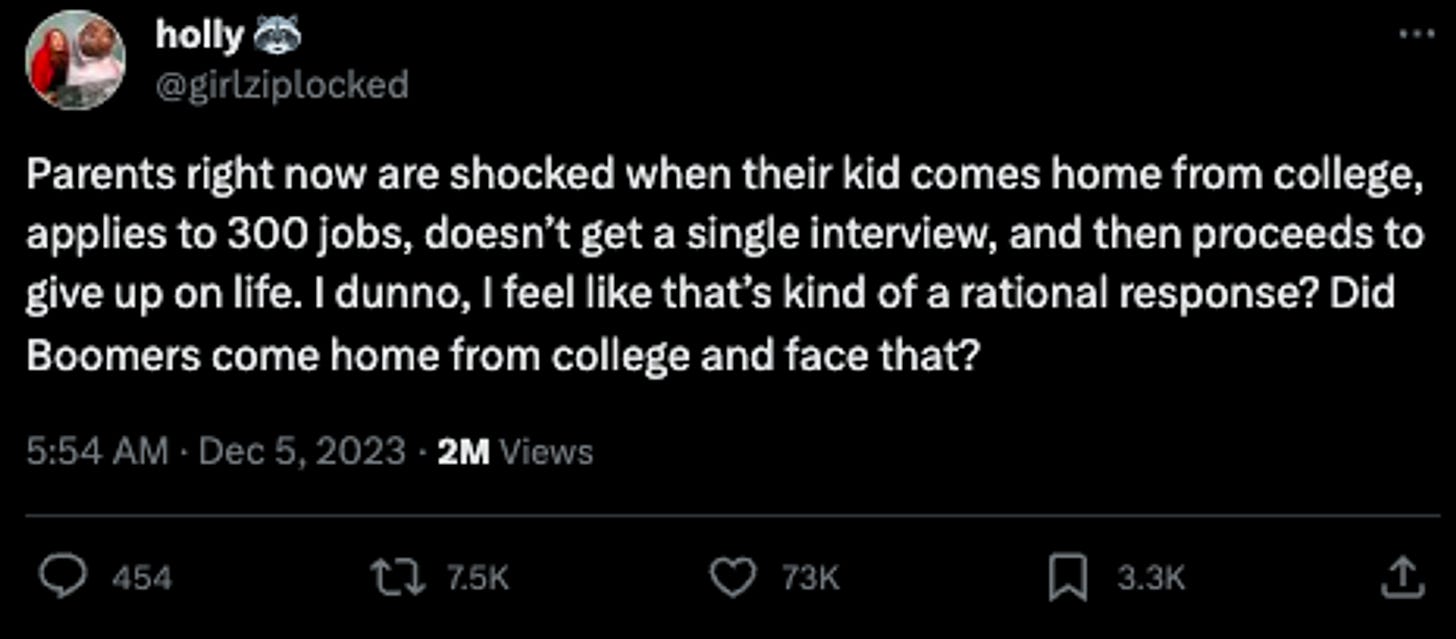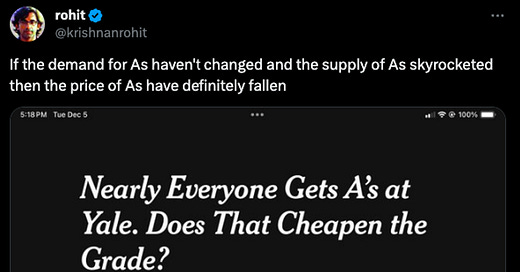New York Times has questions.
The actual landscape, however, has changed. Yale now takes in students from all over, in record numbers. They had 52.250 applications for the 2027 class, with 2,275 applicants admitted.
And so, the fact that the Grade A value plummeted doesn’t directly follow only if the demand changed. And if the landscape within which you’re using the As becomes larger. You’re now not looking to get As to get on an easy street to an investment banking or a lawyer job, but to be seen as elite globally in an expanding and highly liquid talent market.
Obviously Yale isn’t alone. Or rather, Yale and the luxury-good universities aren’t alone.

Across almost every domain, in the past few decades, we’ve seen: a) the demandscape expands, b) the supply barriers shrink, and c) success becomes more volatile to predict.
The last is because to become successful there’s no longer a set path, but needs a confluence of luck and timing and skill. It’s much harder to predict what will happen.
Which is why graduating from Yale is still a great deal, just not as great a deal as it used to be. Especially considering the debt. It retains its patina because it’s a luxury good as the supply of spots is kept artificially low.
It’s also why the elites seem unhappy these days, the vibecession. Because it’s much harder for them today than it used to be.
It’s also the case with the creator economy. Youtube, Substack, Instagram, Tiktok. They all have much lower barriers to supply than any traditional option. And as a consequence a much more unpredictable route to success if you take it up.
However, in their case, demand still has a ceiling. There’s only 24 hours in a day. The way attention economy grows here is not just through eyeballs but market expansion. See things in multiple languages, in multiple markets, in multiple formats.
This isn’t quite the case for the more professionally produced content. Netflix became a $200B juggernaut because it produced original content built for all audiences. Supply became a bit more democratised, even though it didn’t quite get cheaper. It’s built for incredible growth boosted by technological power.
Or, for instance, games were hard to make. Then they got easier as PC and flash came up. Then it got easier to create as mobile games came up.
Technology levels the playing field for people who aren’t professionals. A few more random examples:
Newspaper employment fell by 45% between 2008 and 2017
15% growth in DIY graphic design came from non-professionals
375k citizen developers in the enterprise no-code space. Nearly 60% of all custom apps are now built outside the IT department
Robo advisors have $1.5 trillion in assets under management in the last decade
4 million people used online legal services in 2019 and this has been growing
Everywhere you look, professionals are in retreat and the barriers to entry is being lowered. In area after area after area, the very idea of a professional is diminishing. From journalism to finance to graphic design to coding to …….
There’s still the need for pedigree in law or accounting or medicine, but even there the supply of informed amateurs have risen dramatically! Not just WebMD either, almost everyone I know in my generation and below have experience of second guessing a doctor and diagnosing something on their own.
Technology breaks down barriers to do things. Demand pools are concatenated. The price of creation falls and success becomes less predictable, more capricious.
In the before days, there was more control. Now, with seemingly infinite supply, that’s gone. There’s no predictability. You can’t tell who is likely to be successful, since (assuming enough talent) luck and circumstances play an outsized role.
This is about to change again. From Matt Levine:
One possible way to think about large language models is that they are extremely good at being mediocre at a lot of white-collar jobs. Like, if you need someone to research some question about the market for a product or the accounting treatment of a situation or the taxation of a financial instrument, you can ask ChatGPT and it will quickly, cheaply and tirelessly find you an answer that is not necessarily inspired or brilliant, but that is workmanlike and sensible and straightforward and probably right, though sometimes wrong. If you hired a first-year analyst right out of college and asked her those questions and she gave you ChatGPT’s answers, you would not necessarily think “this person is brilliant and will eventually end up running this firm,” but you would find her useful.
And what happens when these jobs too have their barriers to entry demolished?





And no group is more battered by that increasing volatility than college students. The myth of the meritocracy is so thick on college campuses you could lose a boot in it -- it’s hard to just say, "you can be the best and still lose," and expect people to just shrug and not mind their lifetime of effort chasing shadow promises.
There is even more uncertainty in the Corporatopia. The inhabitants are compared to those of the magnificent seven or worse VC-funded startups and the certainty of even half a decade ago is kaput. Anyway on grade inflation, some of us have democratised it too :) https://www.onmanorama.com/career-and-campus/top-news/2023/12/05/shanavas-education-director-a-plus-sslc-evaluation.html